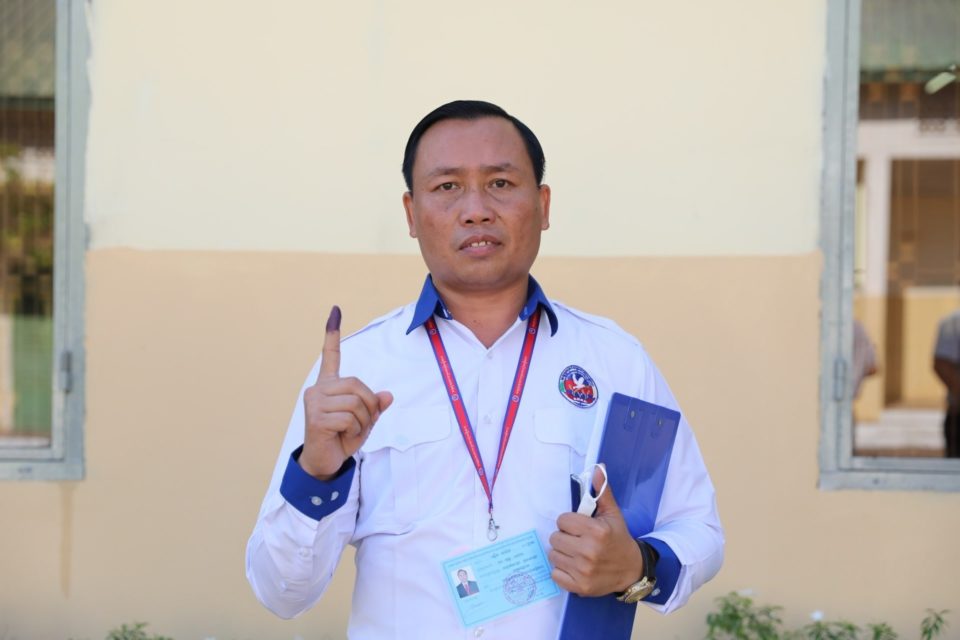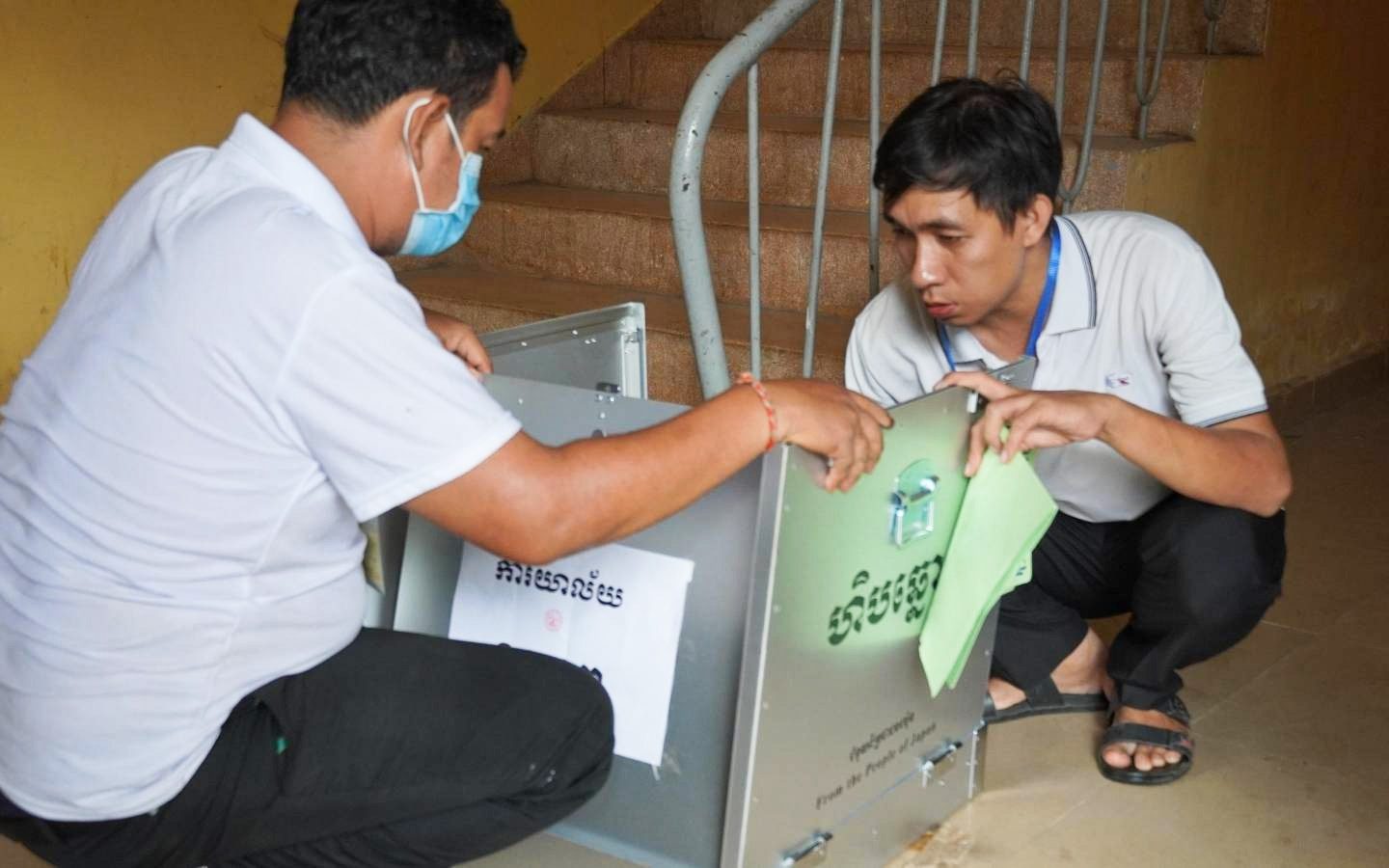The National Election Committee released an initial list of election observers on April 29. Buried among tens of thousands from pro-government groups — including one led by the prime minister’s son Hun Many — were 21 observers from independent election watchdog Comfrel.
While this number of observers remained unchanged for weeks, the observer group was making its own assessments on whether to engage wholeheartedly in the June commune election. Last July, more than 60 civil society groups released a statement listing out six “minimum conditions” that if met would allow for a free and fair election in June.
These included a freer political environment, review of the NEC’s composition and independence in the armed forces and court system.
On May 16, Comfrel had to decide if the political landscape had improved enough to send out observers in the field. Ten months after the release of the statement, Comfrel’s assessment was that two conditions had been met, but only partially: the right of candidates to register for the election and a little more space for the media and civil society groups to function in.
“Since we saw people were engaging and really wanted to [participate], we placed observers though on limited resources,” said Korn Savang, coordinator at Comfrel.
That began a scramble to recruit and train volunteer observers across the country, with little more than two weeks to go for the election. At this point, the registration of political candidates was long done, the media and most other observers were approved by the NEC, and polling agents and candidates were allegedly being intimidated to drop out.
In the end, Comfrel could only muster around 1,950 observers — on average little more than one for each of Cambodia’s 1,652 communes — with Savang admitting this was far from what they were used to in prior elections.
“In short, we were the eyes and nose” in the past,” Savang siad. “And political parties were happy because they knew that our presence has reduced irregularities.”
The Comfrel official is not understating the NGO’s presence during prior elections. The NGO with its allies have released assessments of elections that were independent of the narratives put forth by either the ruling party or even the opposition.
At the 2017 election, Comfrel had 14,580 observers across the country and was part of a coalition called the “Situation Room,” where local groups pooled funding and staff to monitor the elections. Coalition partners like election watchdog Nicfec had 1,052 observers and the PDP-Center registered 229 people across the country.
This was in strong contrast to Sunday’s election, when NEC records show Comfrel’s fewer-than-2,000 observers being drowned out by pro-government observers from Hun Many’s Union of Youth Federations of Cambodia, which contributed around 62% of all observers, and 35% from the Cambodian Women for Peace and Development — headed by Deputy Prime Minister Men Sam An.
Rights group Licadho also pointed out two other groups supplying observers: the Youth League of Peace Lover, whose honorary president is Chum Kosal and an adviser of the prime minister; and the Cambodian Democratic Student Intellectual Federation, where San Visal, the group’s secretary-general, is also a secretary of state with the Ministry of Rural Development.

Naly Pilorge, outreach director at Licadho, said 93% of all nonparty observers were from government-led groups and it was essential to have nonpartisan observers at the ballot boxes.
“It’s crucial for any election to be truly credible that each polling station have observer(s) from independent organizations in order to ensure transparency around vote casting and counting,” she said on Tuesday.
She added that the last time local groups formed the “Situation Room” they were accused of being part of a color revolution and investigated, and Comfrel and Nicfec were accused of violating the NGO Law.
This has probably been the biggest hurdle for independent observer groups in recent years. They have routinely been associated with a so-called “color revolution,” a government narrative that places any dissenting voices in the camp of the opposition CNRP that was allegedly trying to overthrow the government. This strategy was used heavily in the run up to the 2017 election and dissolution of the CNRP.
Comfrel’s Savang said the minute the organization was named as part of the color revolution, word rapidly spread through the grassroots.
“This spread to all levels of authorities,” he said. “They accused the group of going against the government.”
The accusation had a chilling effect on grassroots activists and volunteers who formed the base of election watchdogs like Comfrel and Nicfec.
Sam Kuntheamy, who heads Nicfec, said the group had more than 1,000 observers in 2017, but was down to around 20 on Sunday — less than one for each province.
He said the group’s work was counter to the accusations: They worked to promote democracy and observe elections. But fear had crept through the ranks.
“[Staff] called me saying their parents asked them to quit. Even though they wanted to help, they were worried,” Kuntheamy said.
“[After] we got named like that, we were struggling finding the observers. [Staff] are concerned about their safety.”
Comfrel’s Savang laughs when asked why observer groups, like the one he works for that allegedly tried to overthrow the government, were still allowed to monitor balloting.
“I also talked to the Ministry of Interior about this and the Ministry of Interior said it was political talk,” he said. “If this was real then Comfrel would have been dissolved too.”
Both Savang and Kuntheamy point to another contentious issue: funding. Both have separately talked about how hard it has been to get funding for this year’s election.
Savang won’t say who the group’s donors are but that Comfrel was told there was no budget for their monitoring activities.
Kuntheamy was a little more explicit about previously getting funds from the National Democratic Institute, but not after the U.S.-based group was tagged as part of the color revolution narrative and given seven days to leave the country in 2017. The group also used to receive funds from IRI and the E.U., both also alleged color revolution participants according to the government.
“We feel regret because we still have the ability to do the work,” Kuntheamy said. “The problem now is we don’t have donors; we don’t know who to ask for funding.”
As election results have flowed in since Sunday, political parties have alleged irregularities in the run-up and on election day. The most widespread gripe has been the presence of local officials at polling centers, which parties say intimidated voters. Other allegations include opaque counting processes at stations and harassment of observers and polling agents.
Parties say they are collecting evidence to present to the NEC, and their evidence has so far been anecdotal or indicative of small violations. Normally, Comfrel or Nicfec would release an assessment of the election — potentially one of the few comprehensive assessments of polls in Cambodia.
Previous reports have monitoring and assessments all the way from voter registration, the media blackout “White Day,” election day, complaints process and the eventual results. The group would provide analysis or statistics of representation of women and ethnic minority groups in the election.
Savang, from Comfrel, said this was no longer the case. They group would release a report of observations from election day, but repeatedly reminded reporters that this would neither be an assessment of the election and its many processes nor would it make a call of whether the election was free and fair.
“Not this time,” he said.












